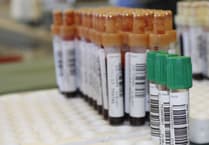Mr Burningham, manager at Devon and Cornwall Rail Partnership, said Devon County Council’s bid for funding for the project was the ‘real deal’.
He was speaking after members of a supporters’ group paced out the site of the proposed new station in Tavistock, whose last rail service was axed in 1968.
The station site is on the former Plymouth to Exeter trackbed, closed in stages during rail cuts of the 1960s and 70s. Part of the line has recently been reopened at Okehampton, reconnecting the West Devon town with Exeter for the first time since the early 70s.
Now supporters of the restoration of the entire former main line across Dartmoor are hoping the success of their neighbours will help persuade the Government to unleash funding to rebuild the line between Tavistock and Plymouth via Bere Alston.
The county council’s Strategic Outline Business Case for the link between Bere Alston - which still has a rail service to Plymouth and Gunnislake - will go before the Department for Transport in June. The council, at the last budget, received £50,000 from the Government towards the preparation of the business case, putting some of their own money up in the process.
Mr Burningham said: ‘My thoughts are that there must be a lot of Tavistock people who are thinking that they’ve been marched up this hill before.
‘But I believe that this is the real deal and we will never get a better opportunity (to get the line restored).’
Mr Burningham said the Government may be swayed by the success of the Okehampton project, which was delivered £10million under budget and earlier than scheduled.
But he said people should not think the link between Bere Alston and Tavistock would happen as fast as the Okehampton project.
He said track between Exeter and Okehampton, which was used relatively recently by freight services, had been still in place, while the line between Tavistock and Bere Alston had been lifted following its closure.
Estimates for rebuilding the Tavistock link, although its trackbed is still relatively uncluttered, range from £100million to £140million.
Mr Burningham said: ‘It’s a process which could take five years. At Okehampton, the line was still there, but in Tavistock’s case you’d have to go through a development order in order to reinstate the railway and that would probably involve a public inquiry.’
It was thought that there was a chance that the Tavistock rail link could be restored in 2008, when developers Kilbridge offered to pay towards the restoration of the service in exchange for building houses.
But that scheme, which would have been unlikely to attract Government funding, was shelved because of its cost.
Mr Burningham, though, said supporters of the scheme were looking at a different scenario. He added: ‘It could be that the Government will say it’s too expensive to build, but in my view I think we are in the best possible position at the moment.’
The project, should it happen, would also give areas of Plymouth a boost via stations by trebling train services for deprived communities and would provide the means of thousands of workers to get to their jobs at Devonport Dockyard, Plymouth University and Plymouth Science Park.
The Peninsula Rail Group, which has long canvassed for the route to be reopened, believes it would take commuters, who are facing ever-increasing fuel costs, off the traffic-choked A386 from Tavistock to Plymouth.
The group are also keen to promote the reopening of the entire route from Plymouth to Exeter via Dartmoor.
They say that would provide an alternative to the current main line, which takes in part of the South Devon coast.
Devon and Cornwall’s rail links were effectively severed by a storm at Dawlish in 2014 which mangled the track and cost the peninsula millions of pounds in lost revenue.





Comments
This article has no comments yet. Be the first to leave a comment.